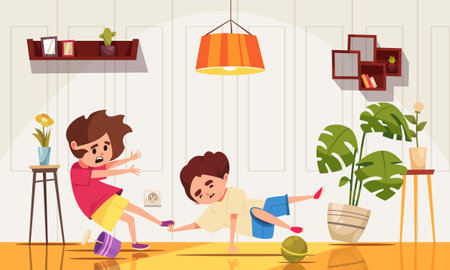1. Understanding Toddler Conflicts
Toddlers are still learning how to navigate social interactions, which often leads to conflicts during playtime. Sharing, taking turns, and expressing emotions appropriately are skills that take time to develop. Understanding why toddlers struggle with these challenges can help parents guide them through disagreements more effectively.
Why Do Toddlers Struggle with Sharing?
Sharing is a complex concept for toddlers because they are in a stage of development where their sense of ownership is strong. At this age, they are beginning to understand the idea of “mine” but have not yet fully grasped the concept of cooperation. Their brains are still developing impulse control and empathy, making it difficult for them to see things from another child’s perspective.
Developmental Stages That Influence Conflict
The way toddlers handle conflicts is closely tied to their developmental milestones. Here’s a look at how different stages impact their behavior:
| Age Range | Developmental Characteristics | Common Conflict Triggers |
|---|---|---|
| 12-18 months | Developing independence; exploring objects and people | Trouble understanding sharing; may grab toys from others |
| 18-24 months | Beginning to assert control; recognizing ownership (“mine!”) | Easily frustrated when asked to share or take turns |
| 2-3 years | Improving language skills; starting to understand simple rules | Pushing boundaries; may argue or refuse to cooperate |
| 3-4 years | Learning empathy; better at verbalizing needs and feelings | Might negotiate but still need guidance in resolving conflicts peacefully |
The Role of Emotions in Toddler Conflicts
Toddlers experience big emotions but don’t always have the words to express them. When they feel frustrated or overwhelmed, they may resort to grabbing, yelling, or even hitting. As parents, understanding that these behaviors stem from emotional immaturity rather than intentional defiance can help us respond with patience and guidance.
Helping Toddlers Express Themselves
You can support your toddler by teaching simple phrases like “Can I have a turn?” or “I don’t like that.” Encouraging them to use words instead of physical actions helps build their communication skills and reduces frustration-driven conflicts.
2. Teaching Problem-Solving Skills
Helping toddlers learn how to resolve conflicts on their own is an important part of their development. Since young children are still learning how to express their emotions and understand others’ perspectives, they need guidance from parents and caregivers to build these skills.
Encouraging Emotional Expression
Toddlers often struggle to put their feelings into words, which can lead to frustration and outbursts. Encouraging them to name their emotions helps them process what they’re experiencing.
Ways to Help Toddlers Express Their Feelings:
| Strategy | Description |
|---|---|
| Use Simple Words | Teach basic emotion words like “happy,” “sad,” “mad,” and “frustrated.” |
| Model Expressing Feelings | Show your child how to say, “I feel upset because…” when something bothers you. |
| Use Visual Aids | Create a chart with faces showing different emotions to help toddlers point out how they feel. |
Teaching Turn-Taking and Sharing
Toddlers naturally want what they see, which can make sharing difficult. Practicing turn-taking in a structured way helps them learn patience and cooperation.
Turn-Taking Activities:
- Use a Timer: Set a timer for a few minutes and let each child have a turn before switching.
- Praise Sharing: When your toddler shares, acknowledge it by saying, “Great job taking turns!”
- Play Cooperative Games: Games where kids work together towards a goal can reinforce teamwork.
Guiding Conflict Resolution
Toddlers need step-by-step guidance on how to handle disagreements calmly. Instead of solving the problem for them, walk them through the process of finding a solution together.
A Simple Conflict Resolution Process:
- Acknowledge Feelings: “I see that you’re both upset.”
- Encourage Communication: Ask each child to say what happened in simple terms.
- Solve Together: Offer choices like taking turns or finding another toy to play with.
- Praise Effort: Encourage their attempts by saying, “You worked together to find a solution!”
Toddlers won’t master conflict resolution overnight, but with consistent guidance and practice, they will develop the skills needed to navigate playtime disagreements more peacefully.

3. Setting Clear Expectations
One of the best ways to prevent frequent toddler conflicts during playtime is by setting clear expectations. When children understand the rules and boundaries, they feel more secure and are less likely to engage in disputes over toys or personal space.
Why Clear Expectations Matter
Toddlers thrive on consistency. If they know what is expected of them, they can better navigate social interactions with their peers. Without clear guidelines, they may struggle to share, take turns, or respect others boundaries.
How to Set Effective Rules
Establishing simple and consistent rules helps toddlers learn appropriate behavior. Here are some key tips for setting effective expectations:
| Strategy | Description |
|---|---|
| Use Simple Language | Keep rules short and easy to understand, such as “We take turns” or “Hands are for helping.” |
| Be Consistent | Apply the same rules in different situations so toddlers learn what is always expected of them. |
| Model Good Behavior | Show your child how to share and take turns by demonstrating it yourself. |
| Praise Positive Actions | Acknowledge good behavior with encouragement like “Great job waiting your turn!” |
| Create Visual Reminders | If needed, use pictures or charts to reinforce important rules in a fun way. |
Encouraging Positive Social Interactions
Apart from setting rules, its important to create an environment where toddlers feel encouraged to interact kindly with others. Here’s how:
- Create Opportunities for Cooperative Play: Choose games or activities that require teamwork so kids practice sharing and working together.
- Avoid Power Struggles: Instead of saying “No” frequently, offer choices like “Do you want to share this toy now or in two minutes?” This gives them a sense of control while still following the rules.
- Toddler-Friendly Conflict Resolution: Teach phrases like “Can I have a turn next?” so they learn how to express themselves instead of resorting to grabbing or pushing.
- Acknowledge Their Feelings: Saying “I see youre upset because you want that toy. Lets find a way to take turns” helps toddlers feel heard while guiding them toward positive solutions.
The Power of Routine in Playtime Expectations
A predictable routine can also help prevent playtime conflicts. When children know when playtime starts and ends, and what behaviors are expected, they are less likely to resist transitions or act out due to uncertainty.
Toddlers may not always follow the rules perfectly, but with patience and consistency, they will gradually learn how to navigate social interactions more smoothly. By setting clear expectations early on, you create a foundation for positive and enjoyable play experiences!
Managing Emotions and Tantrums
Toddlers are still learning how to manage big emotions, and playtime conflicts can sometimes lead to tears, frustration, or even full-blown tantrums. As a parent, your role is to help them navigate these feelings in a way that promotes emotional growth and social skills.
Recognizing the Signs of Frustration
Before a toddler has a meltdown, there are often warning signs. Recognizing these early cues can help you step in before emotions spiral out of control.
| Signs of Frustration | What You Can Do |
|---|---|
| Tense body language (clenched fists, stiff posture) | Kneel down to their level and offer reassurance with a calm voice. |
| Whining or sudden silence | Acknowledge their feelings by saying, “I see youre upset. Lets talk about it.” |
| Pushing, grabbing, or other physical reactions | Gently stop the behavior and redirect their attention to something positive. |
Validating Their Feelings
Toddlers need to feel heard and understood. Instead of dismissing their emotions, acknowledge what they’re experiencing. Simple phrases like “I know you’re upset because you wanted that toy” can go a long way in helping them feel validated.
How to Validate Without Encouraging Negative Behavior
- Acknowledge: “I see youre feeling frustrated.”
- Name the Emotion: “Youre mad because your friend took the toy.”
- Soothe and Redirect: “Lets take deep breaths together and find another fun activity.”
Redirecting Attention to Prevent Escalation
Toddlers have short attention spans, which means shifting their focus can be an effective way to prevent meltdowns. If a disagreement over a toy is escalating, gently guide them toward another engaging activity.
Effective Ways to Redirect
- Create a New Game: Suggest playing with something else or starting a new game together.
- Add Humor: Making silly faces or using a playful tone can lighten the mood.
- Sensory Distractions: Offering a different sensory experience, like playing with Play-Doh or listening to music, can help shift focus.
Navigating toddler conflicts isn’t always easy, but by recognizing frustration early, validating their emotions, and redirecting their attention, you can help create a more peaceful play environment while teaching valuable emotional skills.
5. Encouraging Cooperative Play
Toddlers are still learning how to interact with others, and encouraging cooperative play can help them develop essential social skills like teamwork and empathy. By guiding them through group activities, modeling positive behavior, and setting up structured play opportunities, parents can foster a more harmonious playtime experience.
Creating Opportunities for Teamwork
Providing activities that require toddlers to work together can help them understand the value of cooperation. Here are some fun ways to promote teamwork:
| Activity | How It Encourages Cooperation |
|---|---|
| Building Block Towers | Toddlers take turns adding blocks, learning patience and collaboration. |
| Puzzle Solving | Encourages problem-solving as they work together to complete a picture. |
| Sensory Bins with Shared Tools | Toddlers practice taking turns and using materials together. |
| Dancing or Singing in Groups | Promotes teamwork as they move or sing along with others. |
Guided Play to Teach Social Skills
Toddlers benefit from gentle guidance during playtime. Parents can step in when needed to demonstrate how to share, take turns, or resolve small disagreements. Instead of immediately solving conflicts, ask open-ended questions like:
- “How do you think we can make sure everyone gets a turn?”
- “What can we do if two friends want the same toy?”
- “How can we help each other finish this game?”
This approach helps toddlers think critically about solutions while feeling supported in their learning process.
Modeling Positive Behavior
Toddlers learn best by watching adults. When parents model kindness, patience, and cooperation in daily interactions, children are more likely to mirror those behaviors during playtime. Simple actions like saying “please” and “thank you,” offering help to others, and calmly resolving disagreements set a strong example for little ones.
Phrases That Encourage Cooperation
The words we use matter! Try using phrases that reinforce teamwork:
- “Lets work together to clean up!”
- “Can you help your friend find a toy?”
- “Great job sharing with your brother!”
- “It’s fun when we take turns!”
The Power of Praise and Encouragement
Praising cooperative behavior reinforces positive habits. When you see your toddler sharing or working well with others, acknowledge it with specific praise like:
- “I love how you helped your friend just now!”
- “You waited so patiently for your turn—great job!”
- “That was so kind of you to share your toy!”
This encourages toddlers to continue making good choices in future interactions.
Final Thoughts on Cooperative Play
Nurturing cooperation in toddlers takes time, but through group activities, guided play, and positive reinforcement, they will gradually learn essential social skills. By creating an environment where teamwork is valued and encouraged, parents can help their little ones develop empathy and problem-solving abilities that will serve them well as they grow.


